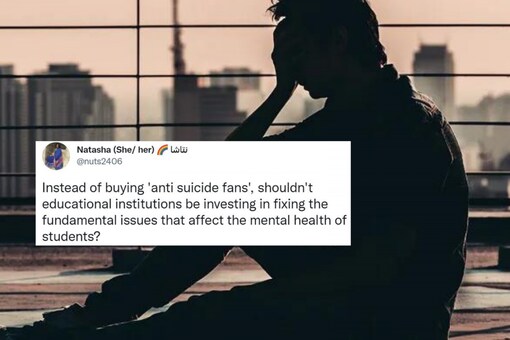
Many pitched in with their views, stating that the problem needed to be nipped in the bud.
The concept of 'anti-suicide' fans did not sit well with many, who thought that not only did it not address the primary problem, but in itself pointed to a wider issue.
NEWS18.COM
SEPTEMBER 17, 2021, 12:35 IST
Student suicides in India isn’t uncommon.
Three NEET 2021 aspirants on Wednesday died by suicide, and although the incident has long-drawn implications of a legal fight against the medical entrance examination in Tamil Nadu, it has once again brought to the fore the issue of students’ mental health.
In February this year, a Chennai student died by suicide allegedly due to the pressure of having to complete the entire year’s syllabus in three months. The deceased, M Praveen, was studying in class 11 at a private school in Kolathur.
In Hyderabad, a PG student of city-based University of Hyderabad (UoH) allegedly died by suicide in her hostel room on the varsity campus.
With these being only a few of many incidents, social media is once again discussing “anti-suicide" fans, which are a type of innovation designed to prevent suicides. The fans have an extensible rod, that extends when under pressure, thus making suicide in that manner physically impossible.
However, the concept of the fans did not sit well with social media, who thought that not only did it not address the primary problem, but in itself pointed to a wider issue.
A tweet reading “‘GOLD Life’ brand ‘Anti Suicide Fan Rod’, manufactured at a factory in Bhandup, Mumbai. Over 50,000 such fan rods are sold/supplied, mainly to Hostels of Educational institutes including IITs, IIMs, AIIMS etc.
A tweet reading “‘GOLD Life’ brand ‘Anti Suicide Fan Rod’, manufactured at a factory in Bhandup, Mumbai. Over 50,000 such fan rods are sold/supplied, mainly to Hostels of Educational institutes including IITs, IIMs, AIIMS etc.
Very great innovation to save human lives," went viral on the microblogging platform, along with a video demonstrating how the fan works being shared by many.
In response, a Twitter user, who goes by Natasha on the platform, wrote: “Instead of buying ‘anti suicide fans’, shouldn’t educational institutions be investing in fixing the fundamental issues that affect the mental health of students?"
Many pitched in with their views, stating that the problem needed to be helping students, not designing fans emphasizing on the need for counsellors and adequate facilities for mental health in educational institutions. “No, we don’t need an “anti suicide fan" in hostels. We need “in campus counsellors" and a curriculum that doesn’t tie marks to “job readiness" / “self worth"!" tweeted one user.
However, some were reluctant to dismiss the “anti-suicide" fans completely and thought there might be some usefulness to them. “Anti suicide ceiling fans or mental health tratment is a false dichotomy. If the fan stopped one person from committing suicide, it is a worthwhile investment," tweeted a user.
A report by WHO published in 2016 showed that India had the highest rate of suicide in South Asia and no robust strategy to prevent it.
Many pitched in with their views, stating that the problem needed to be helping students, not designing fans emphasizing on the need for counsellors and adequate facilities for mental health in educational institutions. “No, we don’t need an “anti suicide fan" in hostels. We need “in campus counsellors" and a curriculum that doesn’t tie marks to “job readiness" / “self worth"!" tweeted one user.
However, some were reluctant to dismiss the “anti-suicide" fans completely and thought there might be some usefulness to them. “Anti suicide ceiling fans or mental health tratment is a false dichotomy. If the fan stopped one person from committing suicide, it is a worthwhile investment," tweeted a user.
A report by WHO published in 2016 showed that India had the highest rate of suicide in South Asia and no robust strategy to prevent it.
India’s rate was 16.5 suicides per 100,000 people while globally, the rate was 10.5. And that was before the pandemic struck.
DISCLAIMER:
DISCLAIMER:
This news piece may be triggering. If you or someone you know needs help, call any of these helplines:
Aasra (Mumbai) 022-27546669,
Sneha (Chennai) 044-24640050,
Sumaitri (Delhi) 011-23389090,
Cooj (Goa) 0832- 2252525,
Jeevan (Jamshedpur) 065-76453841,
Pratheeksha (Kochi) 048-42448830,
Maithri (Kochi) 0484-2540530,
Roshni (Hyderabad) 040-66202000,
Lifeline 033-64643267 (Kolkata)